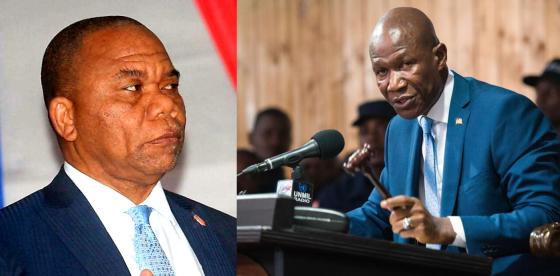Liberia: 54th Legislature Returns with a Hectic Year Ahead

Senate Protemp Albert Chie, left and Speaker of the House Bhofal Chambers
....But what is clear is that the Legislature's attention during its 6th regular session will be diverted to campaigning and less debate on some of these legislations.
Members of the 54th Legislature have returned to work with a packed to-do list in a year when nearly all of them are up for re-election, with the exception of 15 senators.
A total of 88 lawmakers are going for re-election, but they still have to approve more than 20 legislations. These include amendments to the public health law and the drug law.
The busy agenda includes legislation to ban female genital mutilation and the Ratification of the African Continental Free Trade Agreement amongst other key draft legislations.
The agreement promises broader and deeper economic integration and would attract investment, boost trade, provide better jobs, reduce poverty, and increase shared prosperity in Africa.
Liberia is one of the few West African countries that does not have a law criminalizing female genital mutilation (FGM). FGM is a procedure where the female genitals are cut, or changed. Strong taboos surrounding the practice and associated Sande secret societies make tackling it challenging.
But what is clear is that the 54th Legislature's attention during its 6th regular session will be diverted to campaigning and less debate on some of these legislations.
The approval of the budget, however, is one piece of legislation that would certainly pass the House quickly and without any opposition, but not the Senate, where several objections have been raised.
The budget, which the government submitted in December proposed the amount to US$777.9 million — down by nearly US$29 million from the US$806.5 million approved budget for the fiscal year 2022.
However, the 2023 budget is not different from the last five years, featuring massive recurrent expenditures, and yet fails to reach the US$1 billion mark that has been envisioned by the government and less than the fiscal year 2022 budget.
Health, education, security, elections, electricity, agriculture, and finance for the National Elections Commission — would be the budget's top priority.
Meanwhile, ensuring that this budget addresses the alarming situation of youth unemployment and drug abuse, and increases funding to education, given that the country’s investment in human capital development is low.
Also, the issues of boosting access to agricultural funding and support, particularly for local farmers who have begun processing what they harvest, would be a significant consideration.
Meanwhile, the 54th legislation did not deliberate on the budget since its submission was done when most lawmakers were on legislative break.
Now that they have returned, the Senate and House Committees on Ways and Means, Finance and Budget, and Public Accounts will begin working on the budget separately before forming a combined committee to reconcile differences, as has traditionally been the norm.
However, the budget may encounter some difficulties in the Senate rather than the House. The Senate has directed its budget committees to guarantee that the Ministry of Finance and Development Planning provides performance reports on the execution of the 2022 National Budget.
Other areas of concern for the Senate include conclusions on issues on government domestic debt, considering that the proposed budget also allocated US$91.6 million or 11.8 percent of the total budget for public debt servicing, which includes interest and principal payments to domestic and external creditors.
Total domestic creditors account for US$35.1 million or 38.3 percent of the total debt service projected, while external creditors account for US$56.5 million or 61.7 percent. Domestic creditors include the Central Bank of Liberia, commercial banks, and other businesses.
“The Senate Plenary and the Ministry of Finance have not reached a consensus on the payment of a debt owed domestic businesses and other vendors. In this session, the Senate will request the Ministry to provide the names and other information of vendors and other businesses owed and paid from the 2022 National Budget,” said Protemp Albert Chie in a speech yesterday.
“This will be a pre-requisite for the approval of the domestic debt appropriation in the 2023 National Budget. Other safeguards to ensure accountability will be placed in the 2023 Budget Law.”

